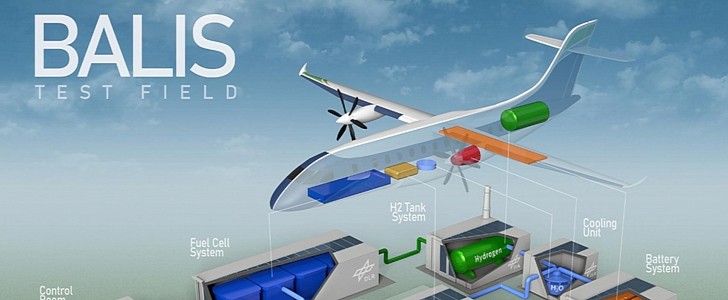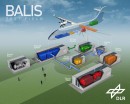Hydrogen fuel cell technology is becoming so important for the future of the automotive industry, that governments in some parts of the world are funding hydrogen production programs, with more and more research and production facilities dedicated to fuel cells being established.
The German government is unfolding a National Innovation Program for Hydrogen and Fuel Cell Technology, coordinated by the National Organization for Hydrogen and Fuel Cell Technology. The multi-million Euros BALIS project, part of this Program, is coordinated by Germany’s national aeronautics and space research center (DLR), and it focuses on developing fuel cell systems with an output of 1.5 MW.
As part of the BALIS project, DLR recently broke ground on the test field that will help develop fuel cell propulsion systems for transportation in general, but mainly for aviation. Located on a 2,000 square meters (21,527 square feet) area on the Empfingen Innovation Campus, in the northern Black Forest, the future test field will consist of seven laboratories.
According to DLR officials, this particular location was chosen because it provides enough space for research, optimal infrastructure and because it’s easily accessible from the DLR Institute of Engineering Thermodynamics main site in Stuttgart. A handful of research and technical support staff from the Institute will be permanently on-site until the facility will be ready to begin operating.
The most interesting thing about this unique test field is that it aims to develop the entire hydrogen fuel cell system, from the fuel cells themselves to hydrogen tanks, electric motors, plus monitoring and control technologies. In other words, it will provide a complete solution for zero-emission aviation.
The ultimate goal is to develop aircraft based on this complete fuel cell system. More specifically, DLR’s fuel cell technology could power a regional aircraft with 40 to 60 seats, and a range of 1,000 km (621 miles).
If everything goes according to plan, DLR’s BALIS test field will kick off its first research projects in 2023, and start testing complete propulsion systems by 2024/25.
As part of the BALIS project, DLR recently broke ground on the test field that will help develop fuel cell propulsion systems for transportation in general, but mainly for aviation. Located on a 2,000 square meters (21,527 square feet) area on the Empfingen Innovation Campus, in the northern Black Forest, the future test field will consist of seven laboratories.
According to DLR officials, this particular location was chosen because it provides enough space for research, optimal infrastructure and because it’s easily accessible from the DLR Institute of Engineering Thermodynamics main site in Stuttgart. A handful of research and technical support staff from the Institute will be permanently on-site until the facility will be ready to begin operating.
The most interesting thing about this unique test field is that it aims to develop the entire hydrogen fuel cell system, from the fuel cells themselves to hydrogen tanks, electric motors, plus monitoring and control technologies. In other words, it will provide a complete solution for zero-emission aviation.
The ultimate goal is to develop aircraft based on this complete fuel cell system. More specifically, DLR’s fuel cell technology could power a regional aircraft with 40 to 60 seats, and a range of 1,000 km (621 miles).
If everything goes according to plan, DLR’s BALIS test field will kick off its first research projects in 2023, and start testing complete propulsion systems by 2024/25.






